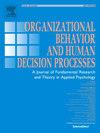The power of pausing in collaborative conversations
IF 3.8
2区 管理学
Q2 MANAGEMENT
Organizational Behavior and Human Decision Processes
Pub Date : 2025-10-09
DOI:10.1016/j.obhdp.2025.104455
引用次数: 0
Abstract
Communicators benefit from being perceived as helpful in collaborative conversations. While research has found that actions preceding such conversations can impact how communicators are perceived, less is known about how speaking style shapes such perceptions. Might how communicators talk (i.e., how often they pause) influence how helpful they seem? Though speakers who spend more time in silence while talking are often perceived negatively, we suggest that brief pauses while speaking can be beneficial. Specifically, we argue that pausing encourages verbal assents from conversation partners (e.g., “yeah” or “uh-huh”), which leads them to perceive speakers more positively. A multi-method study of collaborative conversations, including an analysis of customer service calls and two experiments manipulating pause frequency, supports this account. Although long silences can have impression management drawbacks, our findings indicate that, in collaborative conversations, brief pauses while speaking can make a person seem more helpful because they encourage conversation partners to assent.
在协作对话中暂停的力量
在协作对话中,沟通者会从被认为有帮助中获益。虽然研究发现,谈话前的行为会影响人们对沟通者的看法,但人们对说话风格如何塑造这种看法知之甚少。沟通者说话的方式(即他们停顿的频率)是否会影响他们看起来有多乐于助人?虽然说话时花更多时间保持沉默的人通常会被认为是消极的,但我们认为说话时短暂的停顿是有益的。具体来说,我们认为停顿会鼓励对话伙伴的口头同意(例如,“是”或“嗯哼”),这会让他们更积极地看待说话者。一项对协作对话的多方法研究,包括对客户服务电话的分析和两个操纵暂停频率的实验,支持了这一说法。虽然长时间的沉默可能会对印象管理造成不利影响,但我们的研究结果表明,在合作对话中,说话时短暂的停顿可以让一个人看起来更乐于助人,因为这鼓励了对话伙伴的同意。
本文章由计算机程序翻译,如有差异,请以英文原文为准。
求助全文
约1分钟内获得全文
求助全文
来源期刊
CiteScore
8.90
自引率
4.30%
发文量
68
期刊介绍:
Organizational Behavior and Human Decision Processes publishes fundamental research in organizational behavior, organizational psychology, and human cognition, judgment, and decision-making. The journal features articles that present original empirical research, theory development, meta-analysis, and methodological advancements relevant to the substantive domains served by the journal. Topics covered by the journal include perception, cognition, judgment, attitudes, emotion, well-being, motivation, choice, and performance. We are interested in articles that investigate these topics as they pertain to individuals, dyads, groups, and other social collectives. For each topic, we place a premium on articles that make fundamental and substantial contributions to understanding psychological processes relevant to human attitudes, cognitions, and behavior in organizations. In order to be considered for publication in OBHDP a manuscript has to include the following: 1.Demonstrate an interesting behavioral/psychological phenomenon 2.Make a significant theoretical and empirical contribution to the existing literature 3.Identify and test the underlying psychological mechanism for the newly discovered behavioral/psychological phenomenon 4.Have practical implications in organizational context

 求助内容:
求助内容: 应助结果提醒方式:
应助结果提醒方式:


